11 Things You Should Never Clean with Vinegar
Vinegar’s a wildly popular, multi-purpose household cleaner and disinfectant. Some people won’t clean with anything else. While it’s cleaning effectiveness is debatable, there are some surfaces you should definitely NEVER clean with vinegar.
If you’ve ever looked into natural cleaning products for your home, you’ve likely come across a lot of information about cleaning with vinegar.
You saw the claims that it’s a great degreaser, perfect for streak free windows, and a miracle oven cleaner, but is it?
I get a lot of questions about cleaning with vinegar, and here are my answers to a few of the most common ones.
- Can I clean with straight vinegar?
- Yes you can, but I don’t recommend it. Vinegar is acetic acid with a ph of around 2.6 which makes it a mild corrosive. It can damage many surfaces and there are much better neutral ph solutions for cleaning such as hydrogen peroxide.
- Which vinegar is best for cleaning?
- If you’re determined to use vinegar for cleaning, use a 1:1 mixture of white vinegar and water. Just be very careful which surfaces you use it on.
- How effective is vinegar as a cleaner?
- Vinegar is very effective at cleaning mineral-based scale build-up, and plain glass surfaces like windows, but that’s about it. In my experience, it does very little to remove grease-based messes and will damage protective coatings on most surfaces. It also smells awful.
- Can I mix vinegar with other cleaners to make it more effective?
- NO! But definitely NEVER mix vinegar with bleach or hydrogen peroxide.
- Bleach and vinegar create chlorine gas which is very dangerous if inhaled. It can cause severe eye, skin, and respiratory irritation.
- Hydrogen peroxide and vinegar create peracetic acid which can also cause skin, eye, and respiratory irritation.
- NO! But definitely NEVER mix vinegar with bleach or hydrogen peroxide.

This post may contain affiliate links. Please see my disclosure policy for details.
Messes You Shouldn’t Clean with Vinegar
If you still chose to use vinegar for cleaning, make sure you avoid using it on these surfaces.
1. Granite and Marble Countertops
Granite and marble are naturally occurring, porous stones that are polished and sealed to create a gorgeous and versatile countertop solution.
They’re typically pretty easy to clean and very resistant to most damage, but like everything else, they aren’t indestructible.
Acidic solutions like vinegar can damage the polished surface of natural stone by etching the glossy finish and eating away the natural stone. The etching causes a rough texture that creates a dull, cloudy surface.
A much better cleaning solution for natural stone is equal parts rubbing alcohol and water. Just spray on and wipe off.
Make sure to protect your stone countertops from spills by sealing them yearly with a good sealer.
GET YOUR CLEANING DONE DURING THE WEEK!
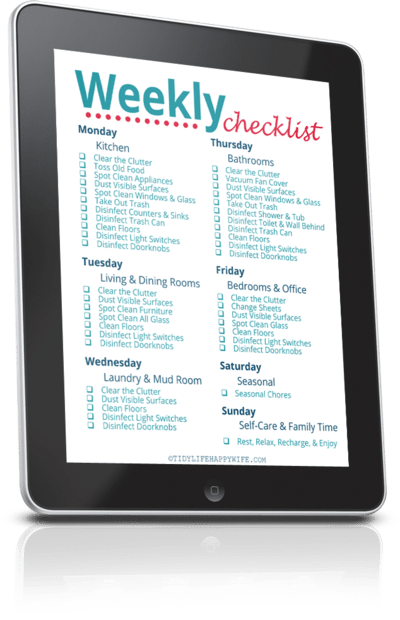
Join thousands of VIPs for cleaning, decluttering, and organizing tips sent straight to your inbox. As a welcome gift, we’ll send you this FREE printable Weekly Cleaning Checklist that lists exactly what to deep clean in every room of your home.
2. Cast Iron Cookware
One of the many benefits of cast iron cookware is that it’s virtually indestructible once seasoned properly. The problem is how to properly clean it without removing the seasoned layer.
Vinegar’s acidity will not only remove crusty bits of food, but it’ll also remove that layer and dry out your pan.
Once it penetrates the seasoning, the vinegar will start to erode the iron and cause unsightly pits in your cookware which make your pan prone to rusting.
Vinegar can be used to remove rust from a cast iron pan, but the pan will need to be reseasoned to protect it.
I find that scrubbing with kosher salt and a stiff bristle brush, then a quick rinse with hot water is the most effective regular cleaning method for cast iron cookware.
3. Hardwood Floors
Most modern-day hardwood floors have a protective finish of polyurethane or aluminum oxide on them. These finishes make the floors bright and glossy while protecting them from daily damage.
The acids in vinegar attack and eat away at these finishes, eventually making them look dull, dingy and cloudy much like the stone countertops.
Cleaning hardwood flooring with vinegar is also one of the many things that can void the manufacturer’s warranty.
The best way I’ve found to clean my hardwood floors is a quarter cup of Mr. Clean to 1 gallon of water and a spin mop. After 12 years, they still look brand new.
4. Rubber Appliance Gaskets
You know those flexible rubber gaskets that create the seal on your refrigerator, dishwasher, and washing machine?
Those are typically made from a soft, synthetic rubber and are an incredibly important part of keeping your appliances functioning properly.
When the gaskets start to fail, the appliances won’t seal. A leaky gasket can cause higher energy costs and water leaks just to name a few issues.
Never clean these rubber gaskets with vinegar because it will eat away at the rubber and degrade the sealing properties.
I prefer to clean my gaskets with an equal parts mixture of hydrogen peroxide and water. Spray it on, let it sit for a few minutes, then wipe off. The peroxide also helps kill any developing mold or mildew.
Don’t forget to condition your seals with a little petroleum jelly at least once a year. I do this any time I deep clean my refrigerator.
5. Ceramic or Stone Tile Flooring
Much like natural stone countertops, ceramic or stone flooring tiles normally have a glossy, sealed or glazed finish.
The acids in the vinegar will attack, etch, and degrade this finish.
I use one cleaner on all of my hard floors. Mix 1/4 cup Mr. Clean to a gallon of water and a spin mop. You can also use a spray mop for quick clean-ups.
6. Raw Egg Messes
Raw egg messes are slimy and extremely difficult to clean up.
Before you reach for the vinegar spray bottle, you should know that vinegar will cause that slimy egg mess to coagulate. The solidified egg is very difficult to remove, especially from hard, porous surfaces like natural stone countertops or flooring.
Instead, cover up large messes with a slice of bread. Let the bread soak up the liquid for a couple minutes, then scoop up and toss the gooey mess. Sprinkle any remaining egg slime with a bit of kosher salt and let it sit for a couple minutes.
Wipe up with a damp rag and scrub with a little hydrogen peroxide for extra cleaning power.
7. Semi-Precious Stones
Many semi-precious gemstones are natural occuring and porous including emeralds, turquoise, onyx, opals, and pearls.
The acetic acid in vinegar can penetrate the porous stone an degrade it, making it weaker and prone to cracking as well as dulling any oiled or polished finishes.
Vinegar can even ‘melt’ a pearl. The acetic acid reacts with the calcium carbonate in the pearl and and leaves behind a small amount of slimy substance.
Don’t believe me? Eggshells are also made up of mostly calcium carbonate. Put a whole, raw egg in a glass of white vinegar and see what happens over the next 48 hours.
Jewelers recommend cleaning your semi-precious gemstones with water and a soft cloth. If that doesn’t do the job, take them to a jeweler and have them professionally cleaned to prevent any damage.
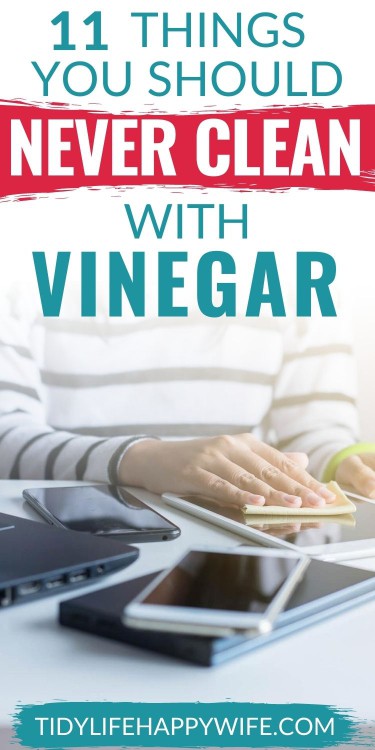
8. Electronics Screens
Vinegar might leave your windows streak-free, but you should never use it on your electronic screens.
Most electronic screens including televisions, computer screens, and smartphones have different coatings on them to prevent glare, scratches and smudging. Those coatings can be damaged and become ineffective when cleaned with vinegar.
Since there are so many different types of coatings that can be easily and irrepairably damaged with the wrong solution, I clean my screens with a slightly damp microfiber cloth followed by a dry one.
If you really want to use a cleaning solution, consult your owners manual to avoid damaging your electronics.
9. Steam Iron
While vinegar is very effective at breaking down and cleaning mineral based scale messes, it can damage the internal pieces and soleplate of your steam iron.
Most modern-day steam irons come with some sort of self clean or easy cleaning setting and you should follow the manufacturers instructions.
Better yet, you can prevent scale buildup by only using distilled water in your iron.
GET YOUR CLEANING DONE DURING THE WEEK!

Join thousands of VIPs for cleaning, decluttering, and organizing tips sent straight to your inbox. As a welcome gift, we’ll send you this FREE printable Weekly Cleaning Checklist that lists exactly what to deep clean in every room of your home.
10. Grout
I’m pretty sure you know what’s coming by now. Don’t use vinegar to clean your grout.
Vinegar will eat through any sealer and eventually seep into the porous grout where it will continue to attack and erode your grout.
Instead, spray with hydrogen peroxide and let it sit. Then scrub with a grout brush and wipe dry.
If the grout is really dirty, you can add some baking soda for extra scrubbing power.
11. Pet Messes
Pet messes of biological fluids are an unfortunate reality of pet ownership and notoriously difficult to clean.
Vinegar might temporarily mask the smell, but it won’t do anything to actually clean and remove the mess. Plus, your pet can still smell the mess and will continue to make similar messes in the same spot.
Instead, use an enzymatic cleaner that will actually neutralize and remove the biological fluids and associated smell. You can also check out these tips for keeping your house clean with cats.
Things You Shouldn’t Clean with Vinegar
Vinegar might be a popular, natural alternative to store bought cleaners, but it has the potential to really damage some of the common surfaces in your home.
Regular use of vinegar to clean granite, marble, and stone countertops as well as stone and tile flooring will degrade the polished finish and eventually etch the stone. It will eat through and erode sealant and grout.
Vinegar wreaks havoc on cast iron cookware by removing the seasoning layer and causing pitting in the cast iron which can lead to rust.
It also eats through the protective coating on hardwood floors and makes them susceptible to water damage all while voiding your warranty.
Cleaning your electronics screens with vinegar can damage and completely remove the protective and anti-glare coatings, and never use it on your semi-precious stones will cause etching or worse yet, melt your pearls.
Vinegar will attack and degrade the soft rubber gaskets on your appliances, and damage the internal components and soleplate of your steam iron.
The acetic acid in vinegar will solidify an egg mess and make it more difficult to clean up, and it won’t do anything for removing pet messes.
Tell us the things you never clean with vinegar.

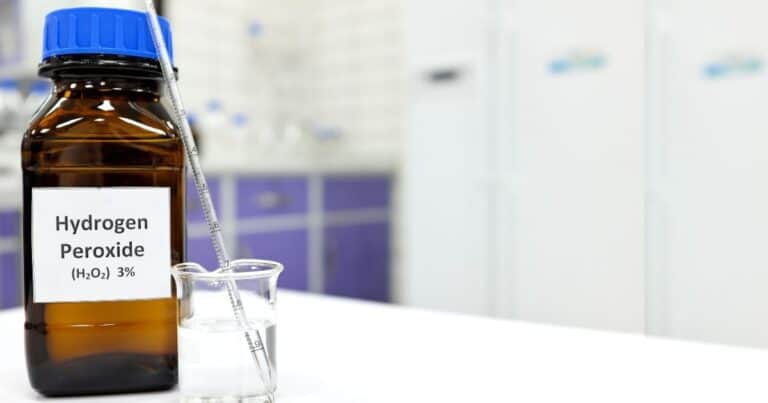
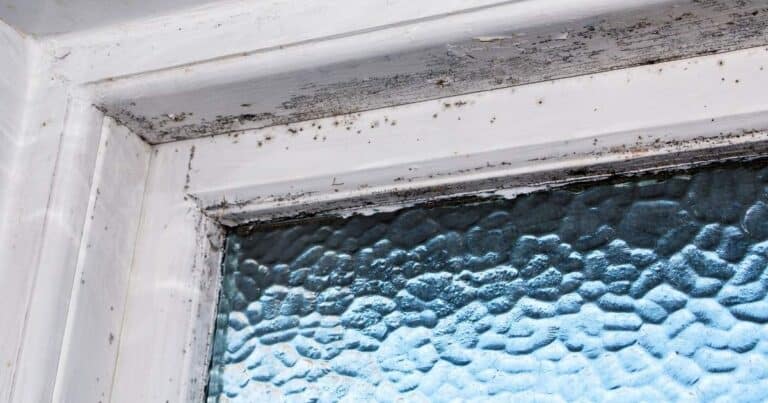
![How to Clean Window Tracks [The Simple Hack that Works Every Time]](https://tidylifehappywife.com/wp-content/uploads/CleanWindow-768x576.jpg)
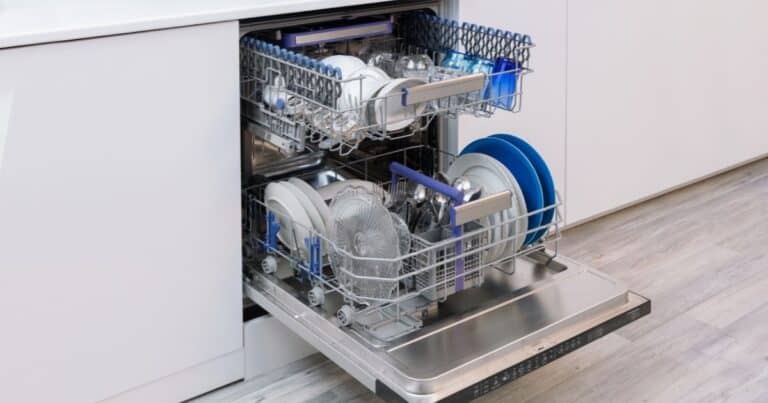

![How to Deep Clean a Disgusting Fridge the Right Way [According to Me]](https://tidylifehappywife.com/wp-content/uploads/Refrigerator-768x768.jpg)